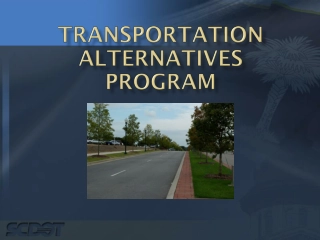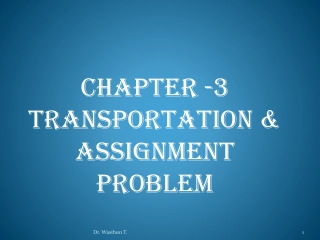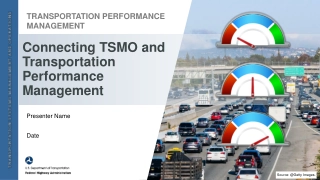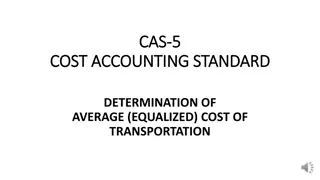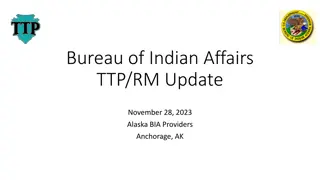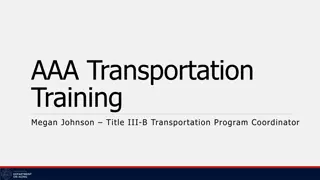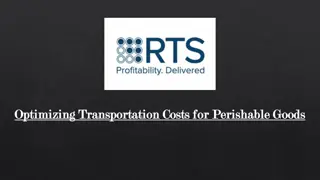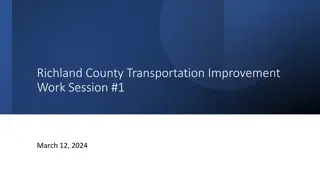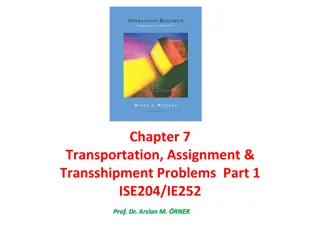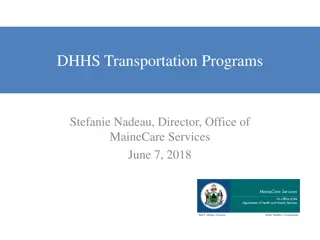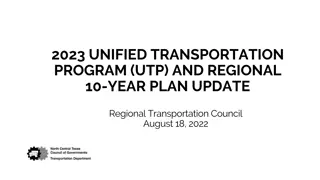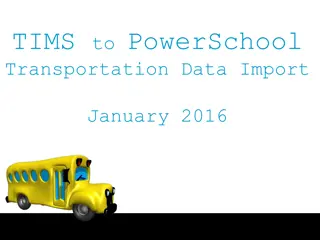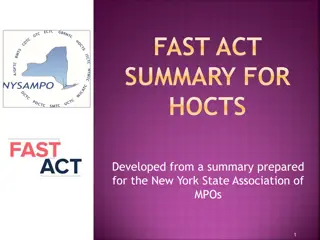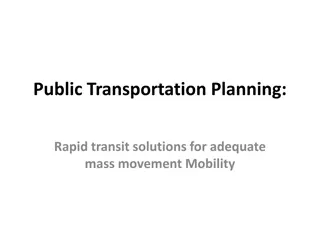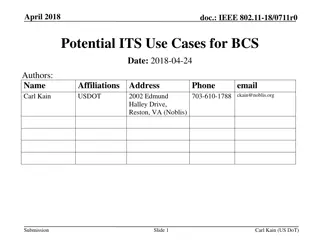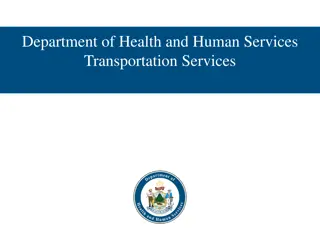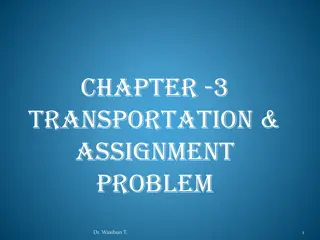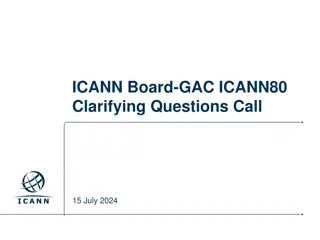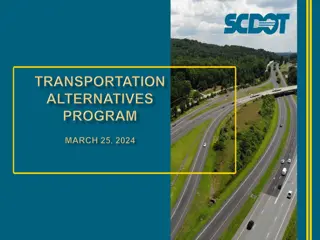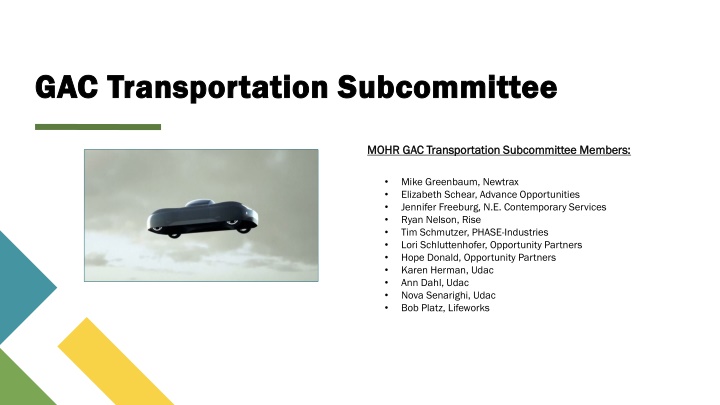
2024 GAC Transportation Subcommittee Priorities and Work Update
Explore the priorities and work of the 2024 GAC Transportation Subcommittee, focusing on developing provider surveys, enhancing member influence within the Metro Council, and improving reporting on in-program transportation costs. The subcommittee aims to refine transportation cost assessments, promote person-centered coordination, and facilitate training for accurate cost reporting. Discover the goals and methodologies of the in-program transportation provider cost survey in Minnesota.
Uploaded on | 1 Views
Download Presentation

Please find below an Image/Link to download the presentation.
The content on the website is provided AS IS for your information and personal use only. It may not be sold, licensed, or shared on other websites without obtaining consent from the author. If you encounter any issues during the download, it is possible that the publisher has removed the file from their server.
You are allowed to download the files provided on this website for personal or commercial use, subject to the condition that they are used lawfully. All files are the property of their respective owners.
The content on the website is provided AS IS for your information and personal use only. It may not be sold, licensed, or shared on other websites without obtaining consent from the author.
E N D
Presentation Transcript
GAC Transportation Subcommittee GAC Transportation Subcommittee MOHR GAC Transportation Subcommittee Members: MOHR GAC Transportation Subcommittee Members: Mike Greenbaum, Newtrax Elizabeth Schear, Advance Opportunities Jennifer Freeburg, N.E. Contemporary Services Ryan Nelson, Rise Tim Schmutzer, PHASE-Industries Lori Schluttenhofer, Opportunity Partners Hope Donald, Opportunity Partners Karen Herman, Udac Ann Dahl, Udac Nova Senarighi, Udac Bob Platz, Lifeworks
Subcommittees 2024 Subcommittee s 2024 Priorities Priorities Priority 1 Priority 1: : Develop & administer provider survey to study & capture true cost of providing in-program transportation. Priority 2: Priority 2: Create & maximize a (MOHR member) position of influence & impact within Met Council s strategic change (Metro Move) protect Person-Centered Coordination & supports (PCC) & associated reimbursement mechanisms, while promoting improvements in operational capacities of accessible transportation options. (See Template on capturing concerns). Priority 3: Priority 3: Provide MOHR Member assistance via scheduled training session on accurately capturing & reporting in-program transportation costs in DWRS Cost Reporting
Subcommittees 2024 Work Subcommittee s 2024 Work In In- -Program Transportation Cost Survey Program Transportation Cost Survey PCC Defined and Metro Move PCC Defined and Metro Move Updated the MOHR Member Resource Packet Updated the MOHR Member Resource Packet - - Waiver Transportation & Market Rate Setting Waiver Transportation & Market Rate Setting Advanced coordination activities between MOHR Advanced coordination activities between MOHR and Mn and Mn- -DOT, MDH, MCOTA and TCAPs/RTCCs DOT, MDH, MCOTA and TCAPs/RTCCs
In In- -Program Transportation Provider Cost Program Transportation Provider Cost Survey Survey Goals: Goals: determine average provider cost of in-program transportation within any given 15-minute unit of DSS, ESS & Prevoc. Establish the average cost per mile, per minute, per trip and as a percentage of the percent of the RMS reimbursed cost of each 15-minute service unit. Distinguish between type of trip (individual, shared, mixed), type of service unit (DSS, Prevoc, ESS/EDS/EES), region of state, type of vehicle used, ambulatory versus non- ambulatory trip, and types of PCC Supports (e.g., staff rider, intensive supports, etc). sdfd
In In- -Program Transportation Provider Cost Program Transportation Provider Cost Survey Survey continued continued Process/Methodology Process/Methodology Used provider sampling, representing northern, central & southern MN, as well as metro area. Respondents tracked and reported data on two, one-week samples between March and July. Data collected for in-program transportation trips provided during each week, for DSS, Prevoc, and ESS/EDS/EES that included transportation activities. This survey did NOT collect data on bookend (Waiver) transportation.
In-Program Transportation (Ride) Data Suvery - 2024 1 Is this an individual ride? If yes, skip to question 4. Yes No 2 In-Program Ride (assign Letter) 3 Number of people (i.e. clients) transported on this ride 4 Ride Miles - Unloaded 5 Ride Miles - Loaded 6 Ride Time in Minutes - Unloaded 7 Ride Time in Minutes - Loaded 8 Type of Vehicle Car Minivan Full-Sized Van Bus 9 Accesible/Non-Accesible Accesible Non-Accesible 10 Vehicle Info Owned Leased Contracted Public Contracted Private Staff Vehicle 10a. If "contracted", estimate cost (e.g., per ride cost, per person transported, per hour, per day/week/month): 11 Service Type for each person DSS PreVoc ESS EDS EES IHS/T # # # # # # Use of wheelchair position on vehicle (i.e., Use of two or more seats due to wheelchair usage) 12 Person Assisted or Accomodations Required (per person) # Use of lift for vehicle entry/exit (with or without use of wheelchair) # Support Staff (not driver) # Service Animal # Equipment/Handling # Camera Support/Monitoring # Multiple Seats/Empty Seat(s) Required # Boarding/Unboarding Assistance Provided # No assistance or accomadation required # 13 Region Metro Small City Town Rural Other
In In- -Program Transportation Provider Cost Program Transportation Provider Cost Survey Survey continued continued Survey Status Update Survey Status Update With the richness of data collected, the Transportation Subcommittee has begun collating & organizing data, while also developing the formulaic equations, based on current empirical data (e.g., cost of fuel, vehicles, mechanics/maintenance, insurances, etc.), in order to isolate and arrive at true costs. Original target for completion was today (8/22). Unfortunately, we do not have final report ready for today, but have a new target completion date of 9/30. A huge thank you to all participating providers, and Umut for expert guidance and support on survey, data and statistical methodology!
Waiver Transportation Waiver Transportation New Transportation Models, Person New Transportation Models, Person- -Centered Coordination (PCC) Supports, and Promoting Coordination (PCC) Supports, and Promoting Quality Quality Centered Subcommittee Priority 2: Subcommittee Priority 2: Create & maximize a (MOHR member) position of influence & impact within Met Council s strategic change (Metro Move). protect Person-Centered Coordination & Supports (PCC) & associated reimbursement mechanisms, while promoting improvements in operational capacities of accessible transportation options.
Waiver Transportation Waiver Transportation continued continued Metro Move Brief Summary Met Council (Public Transit) is providing group rides for Day Programs and Met Council is billing the waiver directly for the rides Plans for expanded hours to also incorporate individualized rides for employment purposes in future stages Starting with 10 metro programs that were previously under agency contracts and have transitioned approximately half of them since their start in the Spring. Rides are still considered public transit so subject to their rules Charging the waiver $26/one-way ride for ambulatory and $34 for wheelchair rides Most metro counties are allowing programs to bill an additional $6.50/ride for Person Centered Coordination (PCC) of rides Hearing mixed results regarding the ease of transition
Person Person- -Centered Coordination (PCC) Centered Coordination (PCC) Supports in Waiver Transportation Supports in Waiver Transportation PCC are those direct and indirect support activities provided to or for the individual to ensure successful provision of their trip(s) under the Waiver Transportation Program. PCC are person-specific, and person-centered. PCC do no include the cost of the operation of the vehicle on which the person is transported. PCC Supports are often unrecognized as cost-drivers by lead agencies, funders and even provider organizations. Recognizing and pursuing equitable funding for PCC Supports rose in importance in late 2023, when Hennepin and other metro counties chose to isolate the reimbursement for PCC as part of pass-through transportation models. Further, the State s and Met Council s approval of the Metro Move program, in which a non-245D licensed agency (a transit agency, in this case) became authorized to bill the Waiver directly for Waiver Transportation.
PCC Guidance for 245D Providers and Lead PCC Guidance for 245D Providers and Lead Agencies in Authorizing Shared Provider Waiver Agencies in Authorizing Shared Provider Waiver Transportation Transportation The State s approval of direct billing of Waiver Transportation by the Metro Move program means that the service components of a given Waiver Transportation trip will, at times, be shared among various providers. This creates the need for lead agencies to authorize multiple units of Waiver Transportation (T2003) to different providers for the same trip, on the same day, for the same person. For example, Metro Move may provide the vehicle, driver and actual transport of a person, while a 245D Licensed Provider may provide scheduling, coordination, and emergency preparedness supports to the same person for the same trip.
Continued Continued Sharing responsibilities among providers in successfully supplying Waiver Transportation to a person is not new. What is new, however, is the need for Lead Agencies to authorize separately the distinct functions of a Waiver Transportation trip across more than one provider via multiple Service Authorizations. The following page contains a categorical listing of Waiver Transportation Add-Ons , in consideration of constructing a unique Waiver Transportation Rate for the Person-Centered Transportation Supports provided by a 245D Licensed Provider. Specifically, these are applicable when Metro Move bills the Waiver directly for one part of the Waiver Transportation Service, and a 245D Licensed Provider bills for other parts of the Waiver Transportation Service.
PCC Guidance PCC Guidance continued continued Categorical List of Person-Centered Transportation Coordination & Support (PCC) Activities & Cost Considerations (Note: Refer to these PCC Add-Ons when billing for Waiver Transportation for same person/same trip is split between transportation provider (e.g., Metro Move) and 245D Licensed Provider) Categories of Person-Centered Transportation Supports Detailed Menu of Person-Centered Transportation Supports provided by 245D Licensed Provider Assumes the following: a) Consistent & reliable schedule & use of transit by the person; b) person may require minimal assistance in setting up and scheduling the "first ride"; 1 Basic Trip Scheduling Coordination: c) person is mostly autonomous in accessing, communicating with and using transit; d) 245D provider does have a contact at their agency for on-demand communication, should assistance/response be needed around the ride. This occurs only periodically, and does not require a 245D staff to travel/provide in-person assistance; e) transit provider is generally on-time (within a 10 minute window) with pick-ups and drop-offs; f) 245D provider does not expend resources in a permanent back-up transit option (e.g., agency vehicle). Assumes any one or more of the following: a) Person needs regular assistance or support in scheduling and/or preparing for a ride; 2 Intensive Trip Scheduling Coordination: b) Person needs assistance, or the availability of assistance, due to reliability issues with transit provider; c) Person needs back-up transportation options "at the ready", including on-demand communication & coordination of such by the 245D Licensed Provider; d) person needs assistance with any applications/certifications, I.D. cards, fare cards, Standing Order requests and changes, or logistics of how fares get paid and re-loaded. Assumes any one or more of the following: a) Person needs in-person DSP/Staff support during the ride (or availability of such); In-Person Assistance (i.e., DSP rider, DSP meeting person at vehicle/stop/etc.): 3 b) Person needs in-person or remote DSP/Staff support in transition to/from vehicle and starting location/ending location. Loading/Unloading in-person Assistance (not otherwise reimbursed by another service type): 4 Assumes person needs in-person assistance in vehicle loading/unloading. Assumes any one or more of the following: a) Person has medical equipment, supplies or medication transported with them on the ride AND the 245D Provider is responsible to ensure the safe availability, use (if needed) and transport of these; 5 Safety Assist: b) Person needs 245D Provider resources in preparing for and responding to critical events during a trip, such as accident, violence on vehicle, medical emergency, interpersonal conflict, risk of abuse mitigation measures, etc. Consideration of at unique accommodation and/or technology assistance required by the person and provided by the 245D Licensed Provider (e.g., provider follow-along in another vehicle, coordination around service animals, technology linking, real-time communication technology, mental health preparation support (e.g., addressing severe anxiety around transportation, etc.) 6 Accommodation Assist:
Subcommittee Priority 3: Subcommittee Priority 3: Provide MOHR Member assistance via scheduled training session on accurately Provide MOHR Member assistance via scheduled training session on accurately capturing & reporting in capturing & reporting in- -program transportation costs in DWRS Cost Reporting. program transportation costs in DWRS Cost Reporting. This Priority was referred back to GAC and the MOHR Board in early 2024, for This Priority was referred back to GAC and the MOHR Board in early 2024, for consideration of developing a more comprehensive provider DWRS Cost Reporting consideration of developing a more comprehensive provider DWRS Cost Reporting Training, beyond that which only includes transportation. Training, beyond that which only includes transportation.
Updates and Brief Updates and Brief Overview of the MOHR Overview of the MOHR Provider Waiver Provider Waiver Transportation Transportation Resource Packet Resource Packet Updated Resource Documents (See online MOHR 2024 Legislative Retreat Portal for each document): 1. Provider Resource Document on the chronology & background of Market Rate Waiver Transportation; 2. Sample Provider letter to their lead agency to renegotiate Waiver Transportation Rates; 3. PCC Activities & Cost Drivers (detailed outline) 4. Mean One-Way Waiver Transportation Provider Cost updated 8/2024 (SEE THIS POWERPOINT).
Waiver Transportation Waiver Transportation Rate & Shared Ride Updates Shared Ride Updates Rate & FACTORS: Need to move away from blended rates Metro Move setting market rates in the metro area Inflationary increase in costs (particularly with nearly 100% increases in bus prices) CONCLUSIONS: Cost to provide any ride starts at nearly $20/one-way ride regardless of distance and need (cost to board vehicle) Average ambulatory per ride cost when considering all factors approaching mid $20/range (2024 Mean Provider Cost for blended One-Way Trip = $25.63) An additional 50% - 75% additional cost per ride cost for wheel-chair rides
Waiver Transportation Waiver Transportation Rate & Shared Ride Updates Shared Ride Updates continued Rate & continued CONCLUSIONS continued Cost to provide any bookend one-way trip starts at nearly $20/one-way ride regardless of distance and need (cost to board vehicle*). *MCOTA workgroup exploring the study of a standard boarding rate for Waiver Transportation, with PCC Add-On categories & costs (rate adjustments) identified per individual rider. Average ambulatory per ride cost when considering all factors approaching mid $20/range (2024 Mean Provider Cost for blended One-Way Trip = $25.63) An additional 50% - 75% additional cost per ride cost for wheel-chair rides. Word of Caution: when negotiating T2003 Waiver Transportation, be sure lead agencies understand the difference between providers acting as a pass through entity (e.g., Metro Mobility), providers acting as transportation subcontracting entities (e.g., direct contract with a transit agency). Provider costs are very different between the two---know your PCC activities & associated costs when negotiating! associated costs when negotiating! know your PCC activities &
Waiver Transportation Waiver Transportation Rate & Shared Ride Updates Shared Ride Updates continued Rate & continued CONCLUSIONS continued : Many providers and lead agencies are using tiered Waiver Transportation Rate Grids (e.g., the original MOHR Transportation Rate Tool ). Three issues with these grids: The rates within the 0-10 miles are significantly undervalued. The first mile of any trip costs significantly more than every subsequent mile. The grid does not yet account for this phenomenon (this will likely be a new priority for the subcommittee in the next year). The tiered rates do not appear to capture the full capital & operational costs when an individual does not require the use of a vehicle lift, but the vehicle they are transported on includes a lift and is fully accessible (again, this will likely be an area to update for the subcommittee next year). Lastly, while this is not an issue with the original tiered grid, several lead agencies have adopted their own types of tiered grids, but appear to discount in their rate setting the costs associated with unloaded miles.
Interested in Interested in being a being a subcommittee subcommittee member? member? Contact: Tim Schmutzer tschmutzer@phase-industries.org or Mike Greenbaum mikeg@Newtrax.org
Questions? Questions? Thank you! Thank you!

